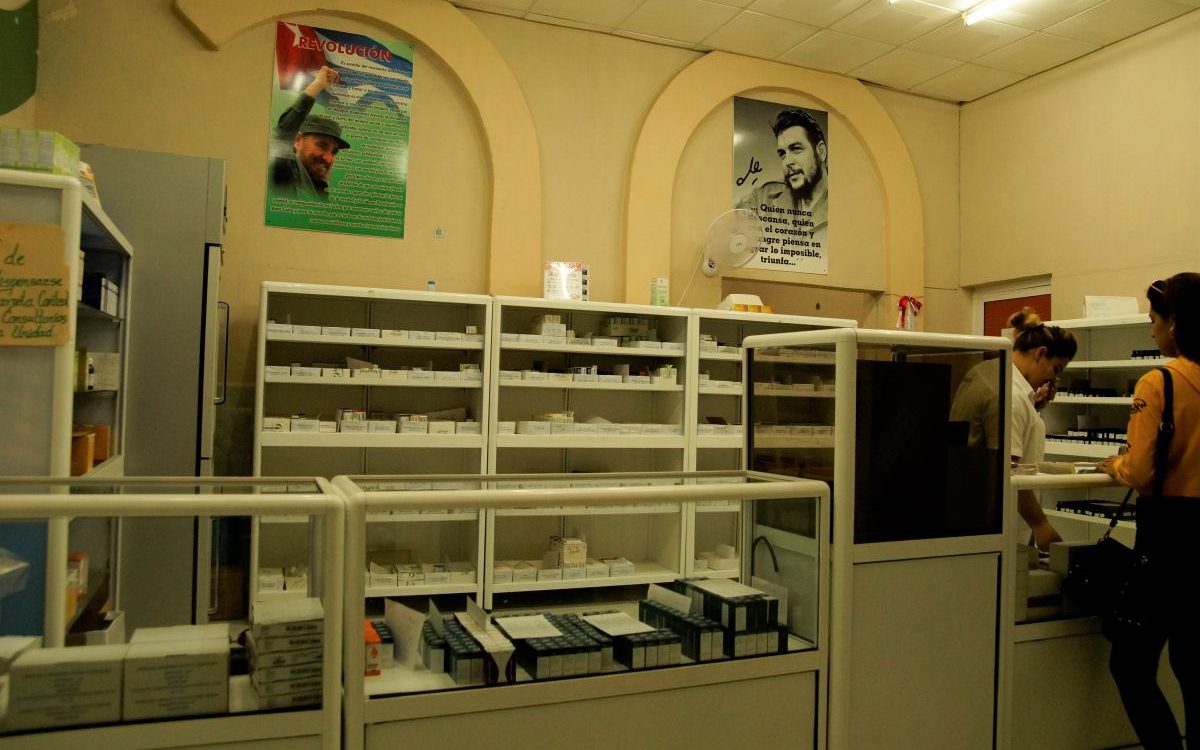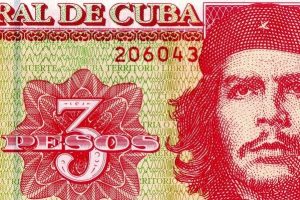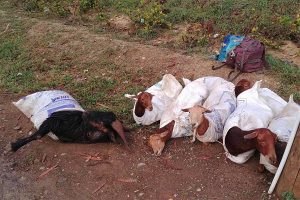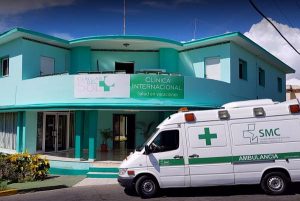Stay Healthy
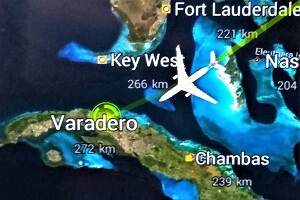
Updated: Dec 19, 2022
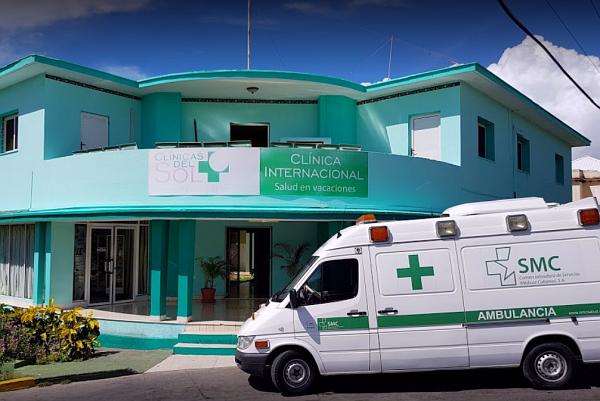
Updated: Dec 19, 2022
Cuba is a relatively safe travel destination. Safe not only in terms of crime risks, but also from a health perspective. Compared to other Caribbean countries, the medical care in Cuba is quite good, even in rural areas. However, there are still some general and for Cuba specif health risks. Luckily, the risks can be reduced through a correct behavior. In addition, you need a travel health insurance for entering the country.
The following content is provided only for basic information. We recommend consulting a doctor, especially for people with previous conditions.
­
Medical care in Cuba
The range of health and emergency care in Cuba is above average compared to other Latin American countries, but not comparable with the technical and hygienic standards of developed countries. The same is the case with the rescue system.
In principle, medical treatment for foreigners is only provided in special hospitals. They are located in holiday destinations and some larger cities. There are also hotels that count with doctors teams.
In case of emergencies, generally all hospitals make the initial treatment. For foreigners, the costs are quite high. Therefore, it is essential that you get the health insurance abroad before you start your journey (see article on health insurance).
­
Vaccinations
Cuban authorities do not request any vaccination to enter the country. Only travelers from yellow fever areas are subjected to different regulations. However, the Robert Koch Institute recommends vaccination against hepatitis A when traveling to Cuba. In the event of longer stays or special exposure, vaccinations for hepatitis B, typhoid and rabies are also advisable.
You should further check if the usual standard vaccinations such as polio, tetanus, diphtheria, whooping cough and possibly mumps, measles, rubella have not lost yet their effectiveness.
­
First-aid kit & Medications
It is essential to bring all the necessary medicines for personal needs, simple bandages, sun protection and insect repellent in sufficient amounts.
If you import medicines, it's recommended to keep them in their original packaging in case of a custom's inspection. For foreigners, health products are not only very expensive, but usually also difficult to get.
While in Cuba, you can buy the most important drugs in so-called international pharmacies, that are located in holiday destinations and some bigger towns, like Havana. The prices for drugs are quite high.
­
Beware of potential health risk in Cuba
There are several infectious diseases in Cuba, mainly transmitted by mosquitoes. Visitors also run the risk of being poisoned with food or, in very rare cases, even becoming infected with cholera. Other risk factors are the high to extreme UV radiation and high temperatures, the air pollution and road traffic.
The most important protective measures are the careful consumption of food, sufficient fluid intake, sun protection measures and exposure prophylaxis against mosquitoes.
­
Mosquitoes
Although there is no malaria in Cuba, mosquitoes can still transmit dangerous diseases. In rare cases, infections with the dengue virus occur. Also, zika virus infections have been registered in recent years, that it is dangerous to unborn children.
The usual measures of precaution are to avoid mosquito bites and infections. For instance, you should wear light-colored clothing that covers the body. The tiger mosquitoes that transmit dengue fiber are active during the day, you can identify them by their striking bright stripes (hence "tigers").
A mosquito net also protects, but this is usually not available in the accommodations. If you travel with children, you should therefore consider bringing one, as children are more likely to develop complications in the event of dengue infection.
During the rainy season and after humid days, you must expect a particularly large number of mosquitoes, more active during twilight. It's advisable to have good mosquito repellents for defense, whereby you should weigh up the health risk from mosquitoes and the chemical of the product.
If you want to use protective agents, then only a product with the active ingredient DEET works. One can say that this is the only really protective substance. The higher the DEET content, the more effective the product.
What is dengue?
Around 400 million people worldwide are infected with the virus every year. The dengue virus is transmitted via the saliva of mosquitoes when they bite. About a quarter of those infected develop symptoms, but the disease is more severe in only a small proportion of sufferers. In addition to the typical fiber, abdominal pain, bleeding mucous membranes and vomiting may occur. The disease can also break out after returning from a trip. However, severe dengue is the absolute exception, only 0.3 percent of sufferers meet the criteria for a severe course.
­
Air pollution
Air pollution is a major problem in Cuba. Also - as in many countries with a tropical climate - air conditioning systems are often contaminated with mold and bacteria. If you stay in air-conditioned rooms (hotels, casa particulars but also buses & trains), it can cause irritation of the respiratory tract. Usually you can end with an unpleasant dry cough or runny nose. A long-term exposure can develop a bacterial infection of the respiratory tract that lasts for several days.
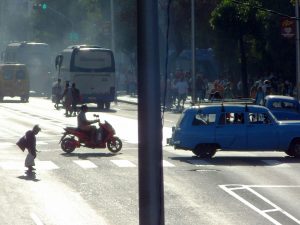
Smog in Havana
In addition, the air near traffic roads is polluted by exhaust gases from vehicles. The old ones are often powered by diesel engines. They let the exhaust fumes into the air practically unfiltered. Pollution is particularly high in cities, especially in Havana. In collective taxis or simple buses it can happen that the exhaust gases also get into the vehicle.
Good planning - choice of accommodation & means of transport - can reduce the health risks of air pollution.
­
Sunburn
Another significant health risk is the sun. You have to expect high to extreme UV radiation, during the summer (around May to October). According to the definition of the World Health Organization, it is considered extreme in the months of June, July and August. There is hardly a place in the world with stronger solar radiation as the Caribbean. The organization recommends staying in closed buildings between 10 a.m. and 5 p.m.
Generally, Cubans are always looking for shade and protect themselves as good as they can, for example with umbrellas. In the Caribbean you should try to avoid the strong Sun as much as possible. Foreigners who roast for hours in the sun arouse amazement and ridicule.
In summer, white people can get burned very fast, during lunchtime already after a few minutes of sun taking. The risk is particularly high at the beginning of a stay. It is not necessary to expose yourself directly to the sun, even on cloudy days, it can damage the skin.
People who fall asleep on the beach during the day can suffer severe burns within a few hours. In 2019, Cuban media showed a case of a white tourist who got such serious burns on the beach that she had to be hospitalized.

Therefore, it is essential to use adequate sun protection. We recommend a combination of passive and active protection:
Passive protection you get from Headgear and long, light-colored clothing with good sunglasses.
For most people are good sun block with a high level of protection mandatory, especially for children at the beach.
Passive sun protection is usually more suitable, at least in cities, as wearing sun block is often not particularly comfortable, especially in the high temperatures. In addition, the sun creams often leave ugly discolorations in clothing that are difficult to remove, especially while traveling. Ideally, you have suitable cloth that you can wear inside the water (hat, top & sunglasses). Cubans like to wear light-colored surf shirts and large hats on the beach and in the water.
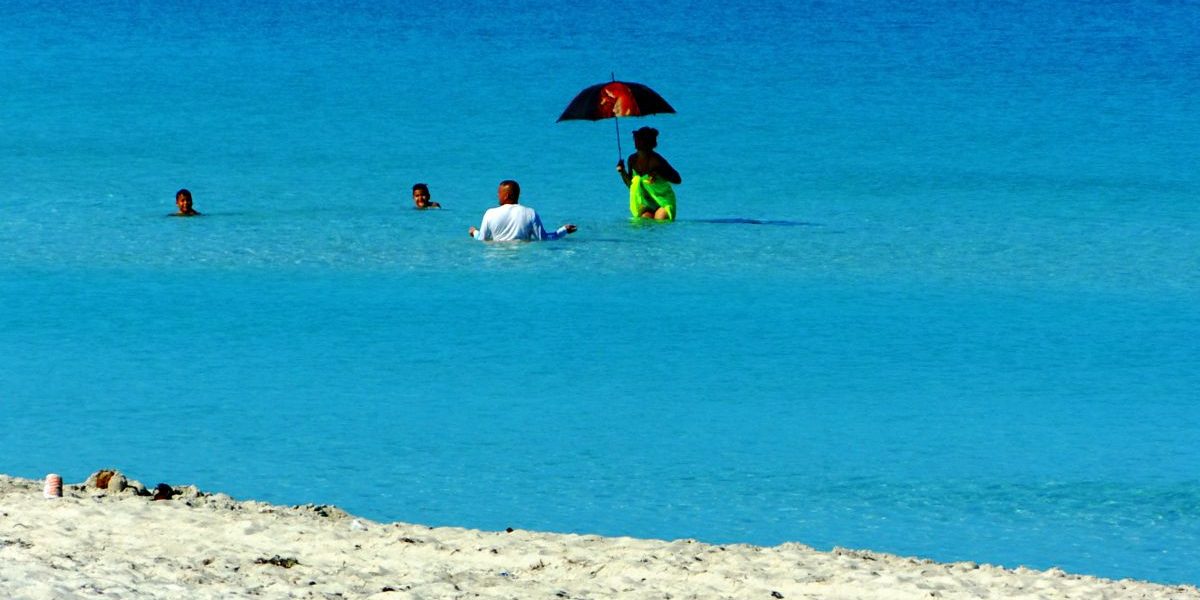
Sun Protection
If you are planning a beach holiday with children, you should consider taking a beach tent or something similar. At lunchtime, indirect solar radiation can also cause burns.
­
Eat & Drink
One of the biggest health risks in Cuba is food poisoning. If you are not careful enough, you can have complaints for days or weeks that ruin the entire vacation. It is never advisable to simply consume everything that is offered carelessly. In order to prevent gastrointestinal disorders or even food poisoning, you should follow a number of rules of conduct, as is usual in similar travel destinations. Basically, you should only consume cooked, peeled or well washed food.
In Cuba it is essential to never drink non-sterilized tap water. The pipe systems are dilapidated, so that contamination with dirty water is common. It is better to only drink bottled water, which in rare cases is not easy to get. In an emergency you can boil tap water or ask the property owner to do so.
You should also be particularly careful with ice (also because of salmonella risk). It is better not to rely on the information given by waiters - not even in the better restaurants or (night) clubs in Havana or Varadero. If you only drink from closed cans or bottles, you are on the safe side.
Especially with fresh fruit juices, which are typically served at breakfast in the Casas Particulares, you should ask if the water has been sterilized. In case you are in doubt, it is better not to drink the juices.
If you get food poisoned, you can get coal tablets in international pharmacies.
What's more, it's highly recommended to take a disinfectant with you. On the island, many public toilets do not have running water. Also, the hygienic conditions in public spaces are not comparable with developed countries.
­
Road traffic
Road traffic is also a risk. In general, vehicles have priority over pedestrians in Cuba. The cars often move towards crossing pedestrians without slowing down. You should never trust drivers to give priority to walkers. In Cuban road traffic, the law of the strongest definitely applies.
Traffic lights are generally respected, but you should also be careful when crossing there, this also applies to zebra crossings, which are primarily decorative.
­
Street dogs & cats
There are many wild dogs and cats throughout Cuba. The animals are fed by people from the neighborhood. Generally, the street dogs are peaceful, but they can be dangerous.
You should be particularly careful when traveling with smaller children. In rare cases, dogs can transmit diseases.
Related
